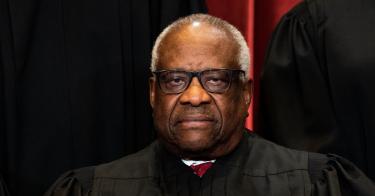The mainstream media has attempted to fact-check Justice Clarence Thomas, alleging that in a recent Supreme Court opinion he falsely claimed that COVID-19 vaccines in part were developed using aborted fetal cells.
Immediately, many of these fact-checkers themselves were fact-checked because they were wrong to say that Thomas himself made the claim.
In his June 30 opinion dissenting from the Supreme Court’s refusal to hear a religious challenge to vaccine mandates, however, Thomas merely was citing a claim made by one of the parties to the case.
But that’s only the start of what the fact-checkers got wrong. Here’s what happened.
A group of health care workers in New York challenged Gov. Kathy Hochul’s mandate that they get COVID-19 vaccines. They objected on the grounds that the vaccines violate their religious beliefs because, as Thomas summarized in his opinion, the vaccines “were developed using cell lines derived from aborted children.”
Two of the fact-checkers simply mischaracterized what Thomas wrote. Politico wrote that “[n]one of the vaccines in the United States contain the cells of aborted fetus.” NBC News said that Thomas wrote that “all” COVID-19 vaccines “are made with cells from aborted children.”
Neither the health care workers nor Thomas said any such thing.
Insider instead quibbled with Thomas’ use of the word “developed,” saying that “[w]hile it is true that fetal cell lines were crucial for developing and testing the efficacy of some of the vaccines, not all of them required the use of those cells throughout development.”
This is hairsplitting.
It is true that one of the three vaccines approved in the U.S.—the Johnson & Johnson one—used “abortion-derived cell lines” during the design and production phase. The other two vaccines—Moderna and Pfizer—used abortion-derived cells during the testing phrase.
But this is all beside the point.
Whether “development” encompasses design, production, and testing or just the first two parts of that process is not what matters. What matters, and what Thomas wanted the Supreme Court to consider, was whether the health care workers should be forced to take those vaccines given their religious objections to the use—at any stage—of abortion-derived cell lines.
To this, the fact-checkers responded by suggesting that the health care workers should not have moral objections.
Politico noted that the practice of using a cell line from abortion is “common in vaccine research.” Insider highlighted that researchers obtained the cell line from an elective abortion many years ago. It also reported that some pro-life organizations, including the U.S. Conference of Catholic Bishops, have taken the position that the vaccines are not morally objectionable.
None of these arguments, however, refutes these health care workers’ moral objection to the vaccines. It isn’t for Politico, or Insider, or anyone else to decide whether someone has a moral objection to a vaccine.
For the health care workers in this case, the use of abortion-derived cell lines in any part of the development process creates moral concerns. They cannot, in good conscience, use products that are even tangentially related to abortion. This is a personal, moral decision of the same nature as, for example, the decision to boycott products from China’s Xinjiang region over the genocide of Uyghur Muslims.
The fact-checkers may quibble all they like with the definition of “development,” but whether someone has a moral objection to the use of abortion-derived cell lines is a personal question—and in this case, one that is based on the health care workers’ sincerely held religious beliefs.
Although it’s unfortunately true that aborted fetal tissue commonly is used in research, as Politico claims, that does not make it morally unobjectionable. This common use instead speaks to how desensitized we have become to the horrors of abortion. Even if the abortion that produced the cell lines happened years ago, these cells are still the byproduct of an unborn child’s violent death.
As to how pro-life sources have characterized the available COVID-19 vaccines, it’s not accurate to say that they are free from moral controversy.
Yes, the U.S. Conference of Catholic Bishops says that in these extraordinary circumstances, it is morally acceptable for Catholics to take some COVID-19 vaccines. But the bishops go on to say that “we should be on guard so that the new COVID-19 vaccines do not desensitize us or weaken our determination to oppose the evil of abortion itself and the subsequent use of fetal cells in research.”
The U.S. Conference of Catholic Bishops, moreover, does not speak for everyone who may have a moral objection to using abortion-derived cell lines in medical research. Neither does any other organization.
So, what exactly was wrong with Thomas’ opinion?
Nothing, except that the justice committed what our left-wing media considers a mortal sin: He forced media outlets to remember that some Americans don’t share their view of morality.
This piece originally appeared in The Daily Signal



